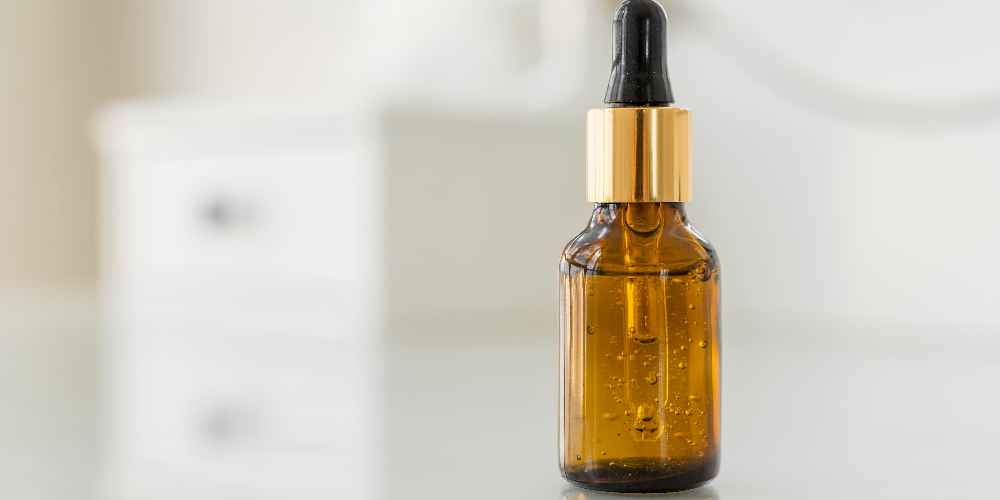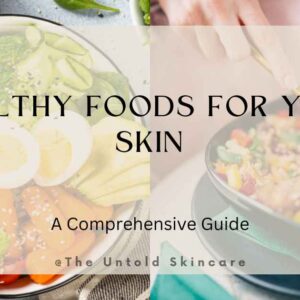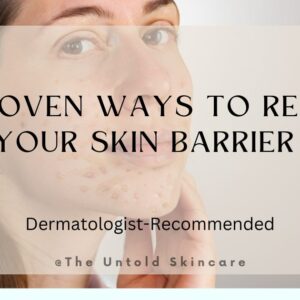Most skincare advice out there sounds like a broken record: wash your face, drink water, wear sunscreen.
And sure, those things are important. They lay the foundation for good skin. But let’s be real: what if you’re already doing all that, and your skin still feels dull, dry, oily, or like it’s just stuck?
What if your breakouts won’t budge, or your fine lines seem to deepen despite all the “right” products?
The truth is, glowing skin isn’t always about doing more; it’s about doing better. And that starts with understanding your skin as part of a much bigger picture: your diet, your habits, your stress levels, and yes, even your mindset.
Most people follow the same generic skincare routine religiously and still struggle. Why? Because skin health isn’t just about what you put on your face, it’s about your entire lifestyle working in sync.
But don’t worry. This isn’t one of those blog posts that throws a complicated 10-step routine at you, or tries to sell you on the latest overpriced serum. Instead, we’re diving into the real game-changers; the best skincare tips that go beyond the surface, tips most people overlook, and lifestyle changes that actually create lasting results.
These skincare tips are not only dermatologist-recommended but also backed by science and research, and easy enough to start doing right now.
Now let’s get into it.
Avoid Sugar
If there’s one thing you must eliminate from your eating window, it’s sugar. If you’re following skincare tips for better skin and still seeing breakouts, this could be the missing piece.
Refined sugars cause rapid spikes in blood glucose and insulin levels, which can lead to increased androgen (male hormone) production and sebum secretion, both major contributors to acne.

Sugar also contributes to glycation, a process that damages collagen and elastin, resulting in premature aging. It also prevents hormonal crashes and mood swings commonly triggered by blood sugar spikes and dips.
You must take control and cut out sodas, desserts, and processed foods if you want real change. It’s not about short-term dieting, it’s about protecting your skin, energy, and mental clarity long-term. For healthy skin, this skincare tip is non-negotiable.
Morning Sun Exposure
Morning sun exposure offers numerous benefits for skin health. The antibacterial properties of sunlight help reduce bacterial overgrowth on the skin, including acne-causing bacteria and fungi.

Moreover, sunlight facilitates the synthesis of vitamin D, which is vital for skin cell growth, repair, and metabolism, contributing to clear and healthy skin.
It is advisable to sit in the morning sun regularly. Typically, 15–20 minutes of exposure is considered sufficient.
Avoid Dairy
Dairy products, particularly milk, have been linked to hormonal acne and skin inflammation in many people. They contain growth hormones and IGF-1 (insulin-like growth factor), which can overstimulate oil glands and lead to clogged pores.

Dairy may also contribute to gut irritation and increase the body’s inflammatory response. If you’re dealing with persistent chin or jawline acne, removing dairy could be the game-changer you’ve been missing. Plant-based alternatives like almond or oat milk are good swaps.
Related Posts: Can Dairy Cause Pimples? The Surprising Link Between Dairy and Skin Problems
Incorporate Antioxidant-Rich Foods
Antioxidants neutralize free radicals that damage skin cells and accelerate signs of aging such as wrinkles, dullness, and pigmentation.
Free radicals are formed due to pollution, stress, poor diet, and UV exposure. Foods rich in antioxidants support collagen production, enhance skin repair, and reduce inflammation.

Antioxidants like vitamin C also promote a brighter, more even skin tone, while others like vitamin A and selenium help regulate cell turnover and protect against acne.
Foods like blueberries, green tea, and spinach help your body fight oxidative stress, which contributes to premature aging and hormonal imbalance. They work hand-in-hand with fasting to boost skin regeneration and reduce inflammation. This is one of the most underrated yet powerful anti-aging skincare tips you shouldn’t skip.
Related Post: 6 Essential Nutrients for Healthy Skin
Reduce Excess Body Heat
Although often overlooked, internal body heat plays a significant role in various skin conditions. Elevated body temperature can lead to redness, inflammation, oily skin, enlarged pores, frequent breakouts, pigmentation, and rashes.
To mitigate these effects, consider incorporating practices that help cool the body. Drinking coconut water daily is highly effective. Additionally, cold foot baths are proven to reduce body heat.
Related Post: How Excess Body Heat Damages Your Skin and What Are the Remedies?
Exercise Regularly
Engaging in regular physical activity enhances blood circulation and promotes the elimination of toxins, both of which are important for achieving clear skin. Additionally, exercise is known to help regulate stress levels, a key factor in overall skin health.

Incorporate 15–20 minutes of light exercise into your daily routine. Yoga postures such as Dhanurasana and Halasana, recommended in Ayurvedic practice, are particularly beneficial.
Related Post: Best Exercises for Glowing Skin
Adequate Sleep
We tend to treat sleep like an optional luxury, but your skin sees it very differently. While you sleep, your body kicks into repair mode, fixing damage, balancing hydration, and building collagen.

People who regularly get 7–9 hours of sleep have been shown to have better skin barrier function and even fewer fine lines. Ever notice how your skin looks puffy or dull after a late night? That’s not your imagination.
So if you’re chasing that glowy, fresh look, don’t underestimate a solid night’s sleep. Think of it as your skin’s nightly reset button.
Reduce Exposure to Blue Light
If you’re staring at screens all day, your skin might be picking up some damage, too. Blue light is the kind of light that comes from phones, laptops, and tablets and can trigger oxidative stress in your skin, speeding up signs of aging like wrinkles and pigmentation.
You don’t have to ditch your devices, but a few changes can help: reduce screen time before bed, use a blue light filter or night mode, and lean into skincare products with antioxidants (like vitamin C) to help protect your skin from the extra stress.
Add Probiotics to Your Diet
If your gut is out of balance, your skin and hormones will show it. You must prioritize probiotics to restore and maintain a healthy gut microbiome.

A healthy gut microbiome plays a crucial role in regulating inflammation and hormonal activity. Probiotics help maintain a balance between good and bad bacteria in the gut, which in turn improves digestion, nutrient absorption, and toxin elimination.
When the gut is imbalanced (a condition called dysbiosis), it often shows up on the skin as acne, rosacea, or eczema. Fermented foods like yogurt, kefir, kimchi, and sauerkraut should be a non-negotiable part of your diet.
Eat Seeds and Nuts
Seeds and nuts are rich in essential nutrients like omega-3 fatty acids, magnesium, zinc, selenium, and vitamin E—all of which are vital for skin and hormonal health. For example, omega-3s found in walnuts and flaxseeds help reduce inflammation and support healthy cell membranes, keeping the skin plump and hydrated.

Zinc from pumpkin seeds aids in wound healing and regulates oil production, while selenium supports thyroid function, which is critical for hormonal balance. Regular consumption of these foods can help reduce acne, PMS symptoms, and even regulate menstrual cycles.
Add seeds like flaxseeds, chia seeds, and pumpkin seeds, and nuts like walnuts, cashews, and almonds to your meals daily. A handful a day can be the difference between hormonal chaos and balance.
Avoid Frequent Eating
If you’re constantly snacking, it’s time to stop.
You need to avoid frequent eating to allow your insulin and hormone levels to stabilize. It is one of the best skincare tips to balance and regulate the body’s insulin and hormonal levels.

When you eat every 2 hours, your body stays in a state of stress, never getting the downtime it needs to repair and detox.
Try to keep a 4-5 hour gap between meals and avoid eating late at night. This one change alone can help reduce acne, improve sleep, and support natural hormonal balance.
Use Non-Comedogenic Products
No matter what you do, clogged pores can always undo your skin progress. That’s why one of the best skincare tips you must adopt is to switch to non-comedogenic products. These are specifically formulated not to block pores.
Whether it’s your moisturizer, sunscreen, or makeup, using pore-clogging products can trigger breakouts, especially if you already have acne-prone or oily skin.
They allow your skin to breathe, reduce congestion, and support a smoother, clearer complexion.
Proper Exfoliation
Exfoliation should always be there in your skincare routine. Exfoliation helps remove dead skin cells that accumulate on the surface and cause your skin to look dull, rough, or uneven. These dead cells can also clog pores, leading to breakouts and preventing your serums or moisturizers from absorbing properly.

Regular exfoliation reveals the fresh layer underneath and promotes faster cell turnover. This is crucial not just for maintaining a clear complexion but also for fighting early signs of aging.
Always use chemical exfoliants like salicylic acid and glycolic acid, and do it consistently (2-3 times a week).
Related Post: The Simplest and the Only Topical Skincare Routine You’ll Ever Need
Add a Few Skincare Actives
While it is optional, this skincare tip is crucial to elevate your routine. Including active ingredients tailored to your skin type and concerns can make a noticeable difference in the health and appearance of your skin in a shorter time.

Choosing the right actives is critical, and this is where personalized care really comes into play. If your skin feels tight, flaky, or looks dull, Hyaluronic Acid is the ideal active for you.
If you’re starting to notice fine lines, uneven texture, or pigmentation, Retinol is one of the best anti-aging skincare actives to consider.
For acne-prone skin, you can add Benzoyl peroxide-based products to your skincare routine. And if you’re dealing with clogged pores and excess oil, Salicylic Acid (a BHA) should be your go-to active.
When used wisely, these ingredients can be the turning point in your journey to glowing, healthy skin.
Related Post: 5 Best Skincare Ingredients of all Time
Do not Pick Pimples and Acne
As tempting as it may be, picking or squeezing pimples can seriously damage your skin.
When you pop a pimple, you risk pushing bacteria and debris deeper into the skin, which can lead to more breakouts, infections, or long-lasting scars. It also disrupts your skin’s natural healing process, often leaving behind dark marks and uneven texture.
It is also an important skincare tip since it can seriously harm your skin if ignored completely. You need to be patient and gentle with it. Healthy, glowing skin doesn’t come from picking, it comes from care, prevention, and the right habits.
Treat Your Skin Gently
Perhaps the most underrated skincare tip of all time is simply to be gentle with your skin.
Avoid harsh scrubbing, over-washing, or tugging at your face while applying products. Always use a soft towel to pat (not rub) your skin dry, and apply products using light, upward strokes.

Gentle treatment helps maintain your skin’s natural barrier, reduces inflammation, and supports long-term skin health.
It’s something even dermatologists always emphasize when sharing expert skincare tips for better skin.
Consistency
You may think why this is even on the list, but it truly is one of the most important ones.
No matter how expensive your products are or how perfectly you follow a routine for a few days, if you’re not consistent, it’s not going to work.
Skincare is not a one-time fix; it’s a long-term commitment. Whether it’s applying sunscreen daily, using active ingredients, following a healthy diet, or avoiding acne-picking, everything depends on your ability to stick with it.
Also Read: How to Get Clear Skin? 20 Tips That Include Everything
Last Words…
Achieving glowing, healthy skin isn’t about following trends. It’s about consistently making the right choices that support your skin’s unique needs.
From eating antioxidant-rich foods and using dermatologist-recommended products to avoiding common mistakes like picking at acne or over-washing, these best skincare tips form the foundation of a healthier and clearer skin.
Remember, skincare is both internal and external. And you need to take care of both factors.
By following these skincare tips, you are not just improving your appearance, you’re investing in your long-term skin health.
“Beautiful skin requires commitment, not a miracle.”
Start with these small but powerful changes today, and you’ll be amazed at the transformation over time.





